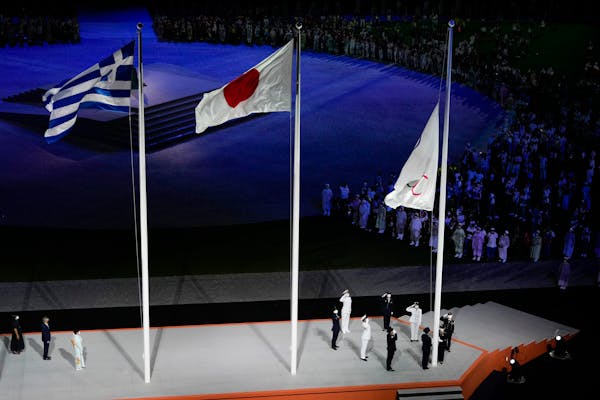TOKYO — Thanks to COVID-19 prevention protocols, athletes at the Tokyo Olympics were forced to remain sequestered from the public, unable to roam around the city or experience the culture. As the Games ended Sunday, Tokyo tried to give them a little glimpse of what they missed.
On the floor of Olympic Stadium, organizers of the Closing Ceremony set up a faux park, complete with actual grass. The idea was to bring a slice of everyday Tokyo life to athletes who had seen it only through the windows of their buses. It was a noble effort, but it only underscored how strange the past 17 days had been.
The Closing Ceremony usually is a self-congratulatory affair, with flowery speeches declaring the just-concluded Games as the best ever. Sunday's subdued event felt more like a sigh of relief. The pandemic clung to the Tokyo Games like the city's muggy summer air, but Japan soldiered through, keeping the postponed Olympics on course all the way to the end.
Like nearly every event at the Games, the Closing Ceremony was held in a mostly empty stadium. Most of the 11,000 athletes had gone home, leaving 48 hours after their competitions as the Japanese government requested. Of the 206 participating countries, 63 had no one left in Tokyo to carry their flag into the stadium.
Javelin thrower Kara Winger represented the U.S. in the flag parade. A four-time Olympian, she finished in 17th place and was grateful to compete, even in less-than-ideal circumstances.
"We have more ahead of us, as the world faces the pandemic,'' Winger said. "But I'm happy [the Olympics] happened. It feels very unifying.''
The U.S. made a late rally to lead the medal standings for the seventh consecutive Olympics. The team won 113, including 39 golds. American women led the way with 66 of those, including gold medals in volleyball, basketball and cycling on the final day.
U.S. wrestlers had their best showing since 1984 with nine medals, including gold for the Gophers' Gable Steveson. Swimmer Caeleb Dressel's five gold medals were the most of any athlete in Tokyo.
Even without fans in the stands, the home team excelled. Japan won 58 medals, its highest total ever, and its 27 golds also were the most in its history. Several of those athletes carried the Japanese flag into the Closing Ceremony — along with a doctor, a nod to the infection-control measures essential to pulling off the Games.
From July 1 through Sunday, Olympic athletes, staff, media and other participants underwent 624,364 COVID tests. There were 138 positives, including some athletes who were not allowed to compete.
The Games were awash in hand sanitizer, masked up, socially distanced and separated by Plexiglas. Tokyo's infection rate continued to rise during the Olympics, but officials insisted Games participants were not contributing to the spread.
Dr. Jonathan Finnoff, chief medical officer for the U.S. Olympic and Paralympic Committee, said only two members of the U.S. delegation tested positive between the opening and closing ceremonies.
"The months of preparation to mitigate COVID-19 at these Games paid off,'' Finnoff said. "We created systems that allowed Team USA athletes to train, travel and compete successfully in this environment while keeping the greater community safe.''
The pandemic affected the Games in other ways. With no spectators allowed in Tokyo, venues had the sterile feel of a TV soundstage, which is essentially what they were.
The lack of atmosphere made it tough on athletes who feed off of fans' energy. Family and friends were banned from traveling to Japan, adding to the isolation. The stress of dealing with COVID amplified the pressure of the Olympics, leading some of the Games' top athletes to discuss mental health with unusual candor.
The next Summer Games host, Paris, practiced extreme social distancing during the Closing Ceremony. It participated via video in an exuberant segment, generating hope that the 2024 Summer Olympics might be more normal. The presentation teased a spectacular Games setting, with venues including the Eiffel Tower (beach volleyball), Versailles (equestrian) and the Grand Palais (fencing and taekwondo).
While Paris has three years for the world to get past the pandemic, the upcoming Winter Olympics in Beijing are only six months away. That raises the possibility of a second Games held under prevention protocols. And Tokyo's work is not finished; the Paralympics begin Aug. 24, bringing more than 4,000 international athletes to the city for 13 days of competition.
As the Olympics quietly closed up shop, it seemed Tokyo still had a complicated relationship with the Games. It cost at least $15 billion to stage an Olympics the citizens could not attend. Protests have continued, though the dissenters outside the Closing Ceremony were not as loud as they were during the Opening Ceremony.
Yet the spirit of omotenashi — the Japanese tradition of hospitality — flowed through the Games from start to finish. Sunday, dozens of people gathered near Ariake Arena, the volleyball venue, to wave goodbye to busloads of visitors they never got a chance to meet.
"Under the global pandemic, we all faced such difficult situations,'' said Seiko Hashimoto, president of the Tokyo organizing committee. "How we delivered the Games was under the attention of the world.
"Whatever the situation is, we can overcome. That is something we wanted to show to the world.''




